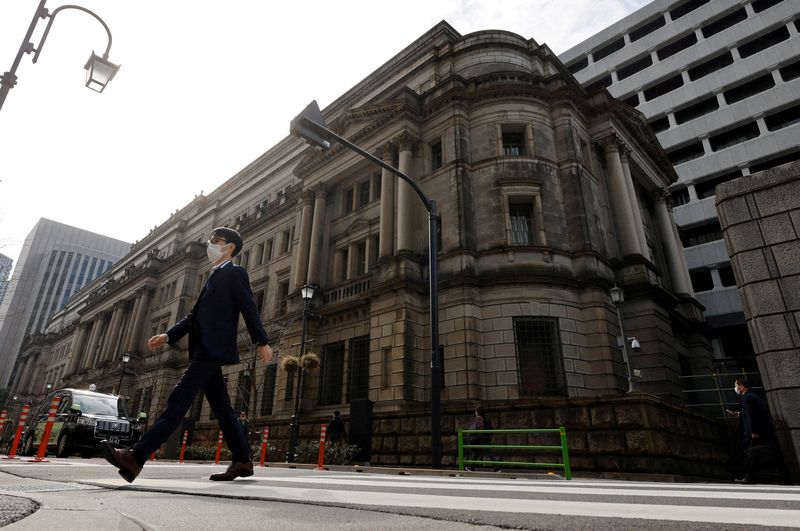(Reuters) - The balancing act between slowing growth and sticky price pressures is top of the agenda ahead of U.S. inflation data and the World Bank and IMF Spring Meetings in Washington.
Kazuo Ueda takes over the helm at the Bank of Japan while U.S. bank earnings kick off and Switzerland's parliament debates the UBS-Credit Suisse tie up.
Here's a look at the week ahead in markets from Kevin Buckland in Tokyo, Ira Iosebashvili in New York, Jorgelina do Rosario, Naomi Rovnick and Karin Strohecker in London.
1/ BANKS' BOTTOM LINES
The uneasy calm that has settled over the U.S. banking sector after the collapse of Silicon Valley Bank will be tested as U.S. financials kick off their earnings season.
The S&P 500 bank index is down 18% since March 8, when SVB troubles became known, followed shortly after by the collapse of Signature Bank and spreading worries over regional lenders such as First Republic.
S&P 500 financials are seen posting first quarter year-on-year earnings growth of 5.2%, putting it among just four sectors whose earnings are expected to climb. S&P 500 earnings are predicted to fall 5.0%, I/B/E/S data from Refinitiv showed.
JPMorgan Chase (NYSE:JPM), Citigroup Inc (NYSE:C) and Wells Fargo (NYSE:WFC) report earnings on April 14, with Goldman Sachs (NYSE:GS), Morgan Stanley (NYSE:MS) and Bank Of America due the week after.
GRAPHIC: U.S. bank deposits https://www.reuters.com/graphics/GLOBAL-MARKETS/THEMES/jnpwylywzpw/Final%20U.S.%20bank%20deposits.png
2/ SWISS QUESTIONS
In Switzerland, the other banking crisis hotspot, parliament holds a special three day session from Tuesday to debate government support and guarantees provided to secure UBS' takeover of Credit Suisse (SIX:CSGN) Group.
There are no expectations of the deal being scuppered but outlines of conditions attached might take shape. The government had to shell out close to 260 billion Swiss francs ($280 billion) of state funding and guarantees.
The debate is expected to be a heated and emotional one for the Alpine nation which has taken much pride in its financial sector and where banking assets make up more than 500% of annual gross domestic product.
Switzerland has instructed Credit Suisse to cancel or reduce all outstanding bonus payments for the top three levels of management and examine whether those already paid can be recovered.
GRAPHIC: Tale of two banks https://www.reuters.com/graphics/CREDITSUISSE-CRISIS/xmvjkbxwwpr/chart.png
3/ UEDA'S TRILLION DOLLAR QUESTION
After a decade in charge of the Bank of Japan, overseeing unprecedented monetary easing aimed at shocking the country into an inflationary cycle, Haruhiko Kuroda passes the baton to Kazuo Ueda on Monday.
Winding down hefty stimulus may prove more challenging than putting it in place, which is why economists generally expect Ueda will take his time before making major changes. Still, investors will strain their ears for policy hints at his inauguration speech.
Inflation is running well above the 2% target and salaries have finally showed signs of catching up, so investors are asking the trillion dollar question of how long crisis-sized stimulus can remain. That's the record amount it cost the BOJ to buy up bonds last year to keep yields in check as emboldened speculators attacked the market.
GRAPHIC: Tokyo core inflation continues to cool https://www.reuters.com/graphics/JAPAN-ECONOMY/INFLATION/lgvdkxkjypo/chart.png
4/ SLIPPERY GROWTH VS STICKY INFLATION
OPEC+ producers sent oil prices spiralling higher on April 2 by announcing output cuts of around 1.16 million barrels per day until the end of 2023. This followed crude price drops in March as banking sector turmoil sparked recession fears.
The big question is whether oil prices will keep rising, feeding higher inflation, or settle to balance the production cuts with a lacklustre global economy.
China's reopening has boosted its domestic economy but demand at its factories remains weak. The latest ISM survey of U.S. manufacturers indicated conditions were dire.
Outside of gains for resources stocks, initial market reaction to OPEC's move was muted, with investors waiting on U.S. inflation data on April 12 to see if price rises have slowed enough to quell central banks' appetite for further aggressive rate rises.
GRAPHIC: Fuel price effect on U.S. inflation https://www.reuters.com/graphics/GLOBAL-MARKETS/THEMES/lgpdkxklrvo/chart.png
5/ SPRING MEETINGS
Policymakers and investors head to Washington for the World Bank and International Monetary Fund Spring meetings starting on Monday. High inflation and financial stability are top concerns.
The Fund will release its latest projections for global growth on Tuesday and a sovereign round table to address countries in debt distress is a key event on Wednesday.
Cash-strapped economies such as Zambia, Sri Lanka and Ghana are still in talks to restructure their overseas debt with much focus on China, the largest bilateral creditor for emerging markets economies.
It will be the first meeting for Ajay Banga, U.S. nominee to run the World Bank and sole contender for the job. Banga says he supports his predecessor's proposal to expand the bank's annual lending capacity by about $5 billion to help tackle climate change and other global challenges.

GRAPHIC: Climate vulnerability by debt service and exports https://www.reuters.com/graphics/EMERGING-DEBT/CLIMATE/mopakynwzpa/chart.png
($1 = 0.9053 Swiss francs)